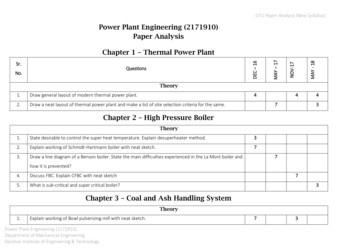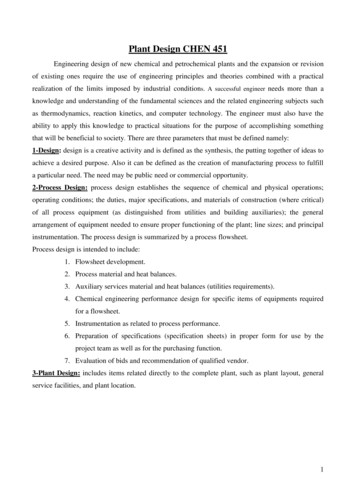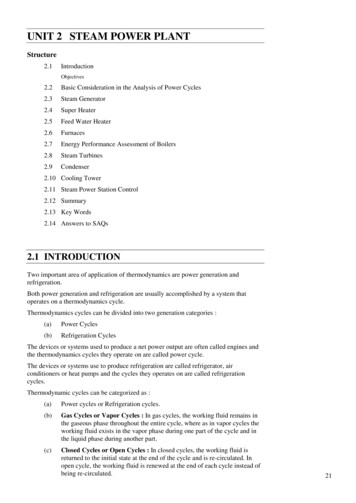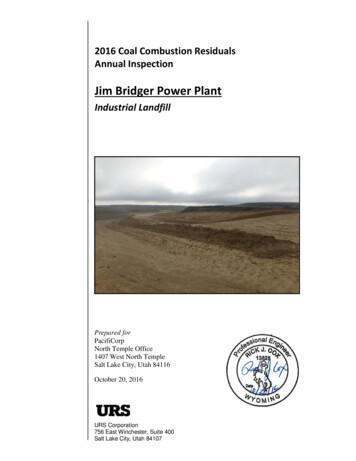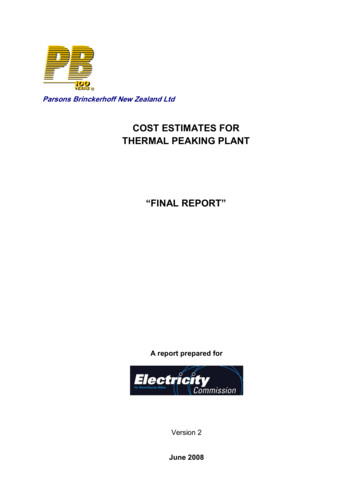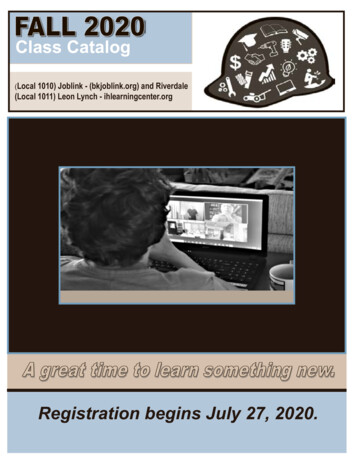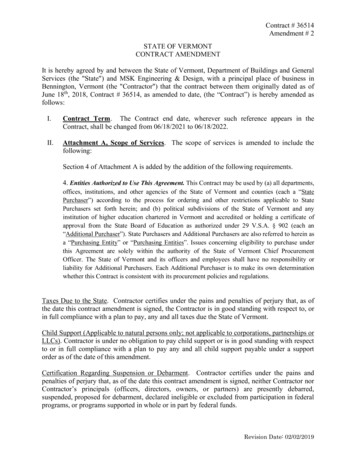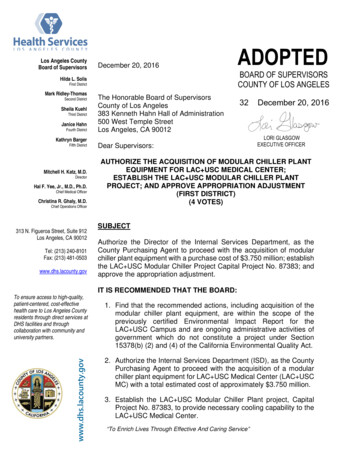
Transcription
CONTRACTBy and betweenTHE BOARD OF TRUSTEES OF THE UNIVERSITY OF ILLINOISandLOCAL #399INTERNATIONAL UNION OF OPERATING ENGINEERS, AFL-CIOEffective July 1, 2018 through June 30, 2021 (inclusive)
ARTICLE TABLE OF CONTENTSArticleSubjectPageIAUTHORIZATION AND PURPOSE1IILIMITATIONS2IIINEGOTIATIONS AND EXCLUSIVE RECOGNITION2IVWAGES4VBENEFITS6VIWORKING RULES AND CONDITIONS7VIIDRUG AND ALCOHOL TESTING12VIIIPARKING17IXPERFORMANCE MANAGEMENT18XGRIEVANCE AND ARBITRATION20XILABOR MANAGEMENT CONFERENCE21XIISENIORITY22XIIIJURISDICTION22XIVNO STRIKE, NO LOCKOUT23XVDUES DEDUCTION24XVIPERIOD COVERED, STATUS DURING NEGOTIATIONSAND COMMENCEMENT OF NEGOTIATIONS24APPENDIX A26ii
SUBJECT TABLE OF l-inClasses RepresentedCondition of EmploymentDrug and Alcohol ProgramDuesGrievance ProcedureHolidaysHoliday PayJurisdictionLabor Management ConferenceLayoffsLimitationsNo Strike/No LockoutNon-Shift WorkerOvertimeParkingPay PeriodsPerformance ManagementPeriod Covered/Status During NegotiationsPurposeSafetySenioritySemi-Shift WorkerShift Worker PremiumShiftsShift WorkerSchedulesTrainingUniformsVacancies – FillingWagesWork DayWork 146-126-74-2 & Apndx A 266-26-2iii
AGREEMENTby and betweenTHE BOARD OF TRUSTEES OF THEUNIVERSITY OF ILLINOISandLOCAL 399, INTERNATIONAL UNION OFOPERATING ENGINEERS, AFL-CIOEffective from July 1, 2018 through June 30, 2021 (inclusive).This Agreement made and entered into by and between The Board of Trustees of the University ofIllinois, a public corporation (hereinafter referred to as Employer) and Local 399, International Unionof Operating Engineers, AFL-CIO (hereinafter referred to as Union) in behalf of certain nonacademicemployees of the Employer identified in Article III hereof.ARTICLE IAUTHORIZATION AND PURPOSESection 1. AuthorizationThis Agreement is authorized by the Illinois Statutes creating the State Universities Civil ServiceSystem of Illinois (110 ILCS 70/36d) and the Illinois Educational Labor Relations Act (115 ILCS 5/1et seq.).Section 2. PurposeIt is the intent and purpose of this Agreement to promote sound and mutually beneficial relationshipsbetween the Employer and the Union.Section 3. Entire AgreementPrevious agreements and commitments by and between the parties, contradictory to provisions hereof,are agreed to be null and void as of the effective date of this Agreement and this Agreement representsthe entire agreement between the parties hereto. Any subsequent amendments hereto must be inwritten form and signed by the authorized official(s) of each party.1
Section 4. No Individual AgreementsThere shall be no individual agreements between the Employer and employee(s) that are contrary tothe provisions of this Agreement.ARTICLE IILIMITATIONSSection 1. LimitationsThis Agreement is subject to: 1) applicable Federal and State laws and regulations issued thereunder asthey may be amended from time to time; 2) rules and regulations of the State Universities Civil ServiceSystem of Illinois as they may be amended from time to time; 3) rules and regulations of StateUniversities Retirement System as they may be amended from time to time; 4) the statutes and rulespromulgated by The Board of Trustees of the University of Illinois as they exist on the effective date ofthis Agreement; 5) provisions of Policy and Rules as they exist on the effective date of this Agreement,or as amended; each of which is incorporated herein by reference.In the event of conflict among any of the foregoing and any provision of this Agreement, the formershall prevail, except where a deviation from the same is set out in express terms herein.ARTICLE IIINEGOTIATIONS AND EXCLUSIVE RECOGNITIONSection 1. Classes RepresentedThe Employer recognizes the Union as the exclusive representative for a single negotiation unitconsisting of employees in the following classes as defined or established by the State UniversitiesCivil Service System of Illinois and employed by the Employer at Urbana-Champaign, Illinois:Steam and Power Plant IVSteam and Power Plant IIISteam and Power Plant IPower Plant Mechanic SupervisorPower Plant MechanicInstrument TechnicianThis exclusive representation is for purposes of determining appropriate ranges of compensation orrates of compensation and other conditions of employment to be recommended to the StateUniversities Civil Service System of Illinois.2
Section 2. Former Classification RecognitionThe parties acknowledge and agree that the classifications set forth below previously were recognizedas falling within the Local #399 bargaining unit, but were deleted from list set forth above becausethose classifications were eliminated by the State University Civil Service System, were no longerused by the University, or otherwise had become inapplicable. To the extent that any of the deletedclassifications are revived by the Civil Service System and used by the University, the University willrecognize those classifications as coming within the bargaining unit, provided that the essential jobduties for those classifications are substantially the same as they were when those classifications werepreviously part of the bargaining unit.Power Plant Mechanic HelperPower Plant Utility OperatorLead Power Plant Operating EngineerPrincipal Power Plant MechanicPower Plant Operating EngineerPower Plant Mechanic IIPower Plant Mechanic ISection 3. New Classes and RecognitionThe Employer agrees that if any new Civil Service class designations should be established for thesame work presently being performed by those classes identified in Section 1 of this Article, said newclasses will be treated as part of the single negotiation unit recognized by this Agreement.Section 4. Equal OpportunityThere will be no discrimination or harassment by either the Union or the Employer against anyapplicant or candidate for employment or employee because of race, color, religion, sex, nationalorigin, ancestry, age, marital status, disability, sexual orientation, civil union status, unfavorabledischarge from the military, or status as a disabled veteran or veteran.Section 5. Rights of EmployerThe Union recognizes the right of the Employer to manage its operations and to plan, direct, andcontrol the policies and conditions of employment of its employees insofar as such policies are notinconsistent with the express provisions of this Agreement. The Employer recognizes the interests ofthe Union in any changes which materially affect the working conditions of those represented by theUnion, and will keep the Union informed as to such changes. Upon written request by the Union, theEmployer will discuss those changes which may be perceived to substantially alter or materially affectthe working conditions of employee representatives, as well as those which may be considered to beinconsistent with the express provisions of this agreement.3
Section 6. Protected ActivityEach employee may make his/her own personal decision with respect to the Union or other employeeorganization membership, without intimidation or coercion. There will be no discrimination againstany employee because of Union membership or because the employee is acting as representative of theUnion or its members or other nonacademic employees pursuant to the provisions of this Agreement orof Policy and Rules.Section 7. Union ActivityThe Union, its members, or any other employee covered by this Agreement will not discuss and/orsolicit membership or carry on Union activity on University premises with employees of the Employerduring working hours unless given express prior approval by the Employer to do so. A UnionSteward, with permission of proper authorities, may leave his/her assigned work to investigate agrievance or to present matters according to Policy and Rules.Section 8. Notification of Recognition:The Employer will notify all new personnel hired to work in the classes covered by this Agreementthat the Union is the authorized negotiating representative for the employees described in this ArticleIII.ARTICLE IVWAGESSection 1. Method of Establishment of WagesWages specified herein have been established in negotiations by and between the Parties. TheEmployer shall recommend these wages to the State Universities Civil Service System of Illinois.Section 2. Effective Date of WagesBargaining unit employees will be compensated during the term of this Agreement based upon thewage rates described below and as set forth within the Appendixes to this Agreement. Employeesshall not be entitled to any wage adjustments following the expiration of this Agreement (June 30,2021), unless and until such adjustments have been specifically agreed to by the parties. For each yearof the agreement (July 1st) wages shall be adjusted by the percentage increase announced by theUniversity of Illinois Urbana-Champaign campus to be the General Salary Policy for Civil ServiceEmployees or by the percentage appropriated by the State of Illinois Legislature for general wageincreases for university civil service employees, or one percent (1%) whichever is greater. Thispercentage increase will be implemented to all classifications represented in this Agreement providedthat all eligibility criteria or parameters for the increase amount are met.4
Section 3. Temporary UpgradesWhen a qualified employee is temporarily assigned to and works in a job classification which is higherthan their regular job classification, the employee shall be paid at the minimum rate for the higher jobclassification for each hour or part thereof that the employee works in the higher classification.Section 4. Pay PeriodsBasic straight time hourly wages are to be paid on a bi-weekly basis.It is understood that due to scheduling, differences may arise in the number of hours actually workedby employees covered hereby in a given calendar period.Section 5. OvertimeAll time worked by the employees covered in this Agreement in excess of eight (8) hours in a workday or in excess of forty (40) hours in a work week (unless otherwise specified herein) is overtime andwill be compensated at time and one-half (1-½) the employee's regular hourly rate (as defined byFederal law). Overtime may only be performed pursuant to specific supervisory direction.When an employee is required to work more than one (1) hour before or after his/her regular shift andcontiguous with his/her regular shift, in addition to pay for his/her regular shift, he/she shall receive anhour additional pay at the basic straight time hourly rate in addition to overtime pay, provided that theemployee works a full eight-hour (8) regular shift.Section 6. Work on Employee’s First Scheduled Day Off in the Work WeekWork done during the employee's first scheduled day off in a work week shall be compensated at therate of time and one-half (1-½)) the employee's regular hourly rate (as defined by Federal law). WhenSunday is a scheduled day off, it will be considered the second day. (Deviation from Policy and Rules).Section 7. Work on Employee’s Second Scheduled Day Off in the Work WeekWork on the employee's second scheduled day off in the work week shall be compensated at two (2)times the employee's regular hourly rate (as defined by Federal law). When Sunday is a scheduled dayoff, it will be considered the second day. (Deviation from Policy and Rules).Section 8. Holiday Work and PayWhen an employee is scheduled to work on a holiday but is excused, he/she shall receive eight hoursof pay at his/her basic straight-time hourly rate.When an employee is scheduled to work and works, he/she shall be paid at the rate of time and onehalf (1-½)) for actual hours worked in addition to eight hours of pay at his/her basic straight timehourly rate.5
If a holiday falls on an employees' scheduled day off, he/she shall receive eight hours of pay at his/herbasic straight time hourly rate.When an employee not scheduled to work on a holiday is called-in for work on the holiday, he/sheshall be paid at two (2) times the basic straight time hourly rate for actual hours worked in addition toeight hours of pay at his/her basic straight time hourly rate. (Deviation from Policy and Rules).It is the prerogative of the Employer to determine the number of employees required for holidayoperation.Section 9. Shift Worker PremiumAn hourly shift premium will be paid to “shift workers” for hours worked. Such premium shall beequal to two dollars per hour ( 2.00/hour). The premium for overtime worked either at double time ortime and ½ shall be three dollars per hour ( 3.00/hour, 1 ½ times the 2.00 rate). “Semi-shift” and“non-shift” workers are not entitled to the hourly shift premium, including hours worked outside oftheir normally scheduled hours. The terms “shift worker,” “semi-shift worker,” and “non-shiftworker” are as defined in Article VI, Section 3.ARTICLE VBENEFITSSection 1. PolicyEmployees’ benefits (e.g., Leaves of Absence, Retirement Disability, Sick Leave, Holidays, Vacationand Personal Leave, Retirement, and Inter-institutional Reciprocity) will be as set forth in Policy andRules. Benefits under the control of the Employer will not be diminished during the life of thisAgreement, and improvements in such benefits will be made applicable to employees covered by thisAgreement on the same date that such improvements are made applicable to other employees of theEmployer.While vacations may be scheduled throughout the entire year and employee's preferences will beconsidered, it is acknowledged that the needs of the Abbott Power Plant must be met first.Section 2. HolidaysThe University recognizes eleven (11) holidays. These holidays are New Year’s Day, Memorial Day(as determined by the law of the State of Illinois), Independence Day, Labor Day (first Monday inSeptember), Thanksgiving Day (the fourth Thursday in November), Christmas Day, and five (5) otherholidays that are designated by either the President or the Chancellor. These other holidays normallyinclude Martin Luther King, Jr. Day, day after Thanksgiving, two floating holidays and one otherholiday designated during the Christmas holiday season. Employees covered by this Agreement willobserve these holidays as described in Policy and Rules Rule 8.02.6
ARTICLE VIWORKING RULES AND CONDITIONSSection 1. Conditions of EmploymentExcept as specifically provided in this Agreement, no change can be made in the conditions ofemployment established herein except by negotiation with the Union, and then only in accordance withPolicy and Rules, Illinois Statutes, and the Rules governing the State Universities Civil Service Systemof Illinois which are and shall be specifically included as part of this Agreement. The Office of theExecutive Director and Associate Vice President for Human Resources will invite the Union to submitits views and comments on Policy and Rules changes which it initiates or processes and will considersuch views and comments in formulating his/her recommendations for University decision.Section 2. Work Day and Work WeekEight (8) consecutive hours which may be broken by (as in Article VI, Section 3) or inclusive of (as inArticle VI, Section 3) a lunch period shall constitute a day's or night's work. The work week is a fixedand regularly recurring period of one hundred sixty-eight (168) hours, seven (7) consecutive twentyfour (24)-hour periods, and begins at 12:01 a.m. on Sunday.The work day is a fixed and regularly recurring period of twenty-four (24) consecutive hours andbegins at 12:01 a.m. on each calendar day. The full-time work schedule will consist of an eight (8)hour day, a five (5) day, forty (40)-hour week. Every effort will be made to arrange shifts so that anemployee will normally work five (5) consecutive days followed by two (2) consecutive days of restexcept as changes in this pattern are necessitated by a change of shift.Section 3. Shifts/Lunch HoursBecause the Abbott Power Plant is a twenty-four hour operation, the Plant has regular shifts scheduledthroughout the day and week, including Sundays and holidays.The Plant currently utilizes three categories of employees:“Shift” employees – Shift employees are assigned to one of three shifts on a rotating basis, andtherefore will be assigned to different shifts and have varied scheduled days off throughout theyear. The three shifts to which these employees may be assigned are scheduled from 8:00a.m. to 4:00 p.m., 4:00 p.m. to midnight, and midnight to 8:00 a.m. Because the Plant’sequipment cannot be left unattended, shift employees are provided a one-half hour paid lunchperiod that must be taken at the Plant and which is included as part of the eight hours workedby an employee on a shift;“Semi-shift” employees – Semi-shift employees generally are assigned to work a designated,fixed shift with rotating days off, which include Sundays and holidays. These employees alsoare provided a one-half hour paid lunch period that must be taken at the Plant and which isincluded as part of the eight hours worked by an employee on a shift; and7
“Non-shift” employees – Non-shift employees are assigned to work from 8:00 a.m. to 4:30 p.m.or 7:00 a.m. to 3:30 p.m. on either a Monday through Friday schedule or a Tuesday throughSaturday schedule, with a one-half hour unpaid lunch period to be taken at noon or at someother mutually agreed upon-time. In addition to the unpaid lunch period, non-shift employeesalso are provided a paid fifteen (15) minute rest period during each half of their shift, as well asa paid ten (10) minute clean-up period before the start of their lunch and a paid fifteen (15)minute clean-up period prior to the completion of their shift each workday.Management reserves the right to re-assign any employee from one category to another upon providingthirty (30) calendar days’ advance notice. Management also reserves the right to modify or createshifts other than those designated above to meet the operational needs of the Plant, as determined bymanagement. If new or different shifts are established, management shall seek to fill those shifts firstwith volunteers. If an insufficient number of employees volunteer for those shifts, management mayassign employees to those shifts based upon inverse seniority within their classification.The parties recognize and acknowledge that, because of differences in operating requirements,employees within the same job classification may be assigned to different shifts and/or to differentcategories as defined above in this section.Section 4. Continuous OperationOperation of the Abbott Power Plant requires continuous service of twenty-four (24) hours per day,seven (7) days per week. The Union recognizes and agrees that the employees it represents willprovide the Employer service on a continuous operations basis.Section 5. SafetyThe University recognizes its responsibility to make all reasonable provisions for the safety and healthof employees and to establish a sound operating practice which will result in safe working conditionsand efficiency of operations, and to accomplish this, will hold periodic safety meetings. The Unionrecognizes the responsibility of the individual employee in this regard and each employee is expectedto abide by the safety rules (which may be posted) and to follow safe work practices to insure his/hersafety as well as that of fellow employees, and to immediately report any unsafe working conditions orwork practices to his/her immediate supervisor. Where an unsafe practice or condition directly affectsa member of this bargaining unit, it shall be entered in the log and reported as stated above either inperson or through a Union representative. If the matter is not resolved, the Union businessrepresentative may take the matter up directly with the Labor and Employee Relations Office.Section 6. SchedulingThe Employer shall post a shift schedule for all employees in the Abbott Power Plant. Work scheduleswill be posted thirty (30) days in advance and will identify swing personnel (extra personnel on ashift). However, when vacations or extended illnesses occur, the Employer may change the shift(s) ofswing (extra) personnel to meet the needs of the Abbott Power Plant.8
In the event that an employee’s work schedule is changed with less than forty-eight (48) hours’ notice,then and in that event, he/she shall be paid the applicable overtime rate for the actual hours worked forwhich he/she had not had forty-eight (48) hours’ notice. (Deviation from Policy and Rules). Thisrequirement shall not be applicable, however, if the employee and management mutually agree to theschedule change, even if less than forty-eight (48) hours’ notice is provided.Section 7. Filling of Temporary VacanciesManagement reserves the right to determine how temporary vacancies (such as those created by anemployee who is absent due to an unexpected illness, a scheduled vacation, or a scheduled absence toobtain medical care) will be filled. In exercising this right, management will consider the Plant’soperational needs, safety standards and the qualifications of individual employees, and will seek to fillthe vacancy using the criteria set forth below:a)Management first will seek to fill the vacancy with a qualified employee who is deemed to bean “extra employee” on the shift in which the vacancy occurs.b)If a qualified “extra employee” is not available to fill the vacancy, management then will seekto fill the vacancy with a qualified employee who is scheduled to work the shift in which thevacancy occurs and who is eligible for an upgrade or downgrade.c)If the vacancy cannot be filled through either of the two steps set forth above, management willseek to divide the hours generated by the vacancy into approximately two equal segments andwill offer the earlier segment to the employee on the preceding shift who has the least amountof accumulated overtime in the classification within which the vacancy occurs. This employeewill “stay over” past their regular shift. The later segment, in turn, will be offered to theemployee on the following shift who has the least amount of accumulated overtime in theclassification within which the vacancy occurs. This employee will “come in early” prior to thestart of their regular shift.d)Whenever a vacancy occurs on short notice, as determined by management, management maydisregard the steps set forth above and require any qualified employee on the shift in which thevacancy occurs to stay past the end of their shift to work mandatory overtime.e)If a vacancy remains unfilled after utilizing the steps set forth above, management will seek tooffer overtime (at time and one-half) to those employees who are scheduled to be on their firstday off of work in the order of the least amount of accumulated overtime within theclassification in which the vacancy occurs.f)Management then will seek to offer overtime (at time and one-half) to those employees who arescheduled to be on their first day off of work and who are eligible to be upgraded to theclassification within which the vacancy occurs. This overtime will be offered to eligibleemployees according to who has the least amount of accumulated overtime.9
g)Management next will seek to offer overtime (at double the employee’s regular rate) to thoseemployees who are scheduled to be on their second day off of work in the order of the leastamount of accumulated overtime within the classification in which the vacancy occurs.h)Management thereafter will seek to offer overtime (at double the employee’s regular rate) tothose employees who are scheduled to be on their second day off of work and who are eligibleto be upgraded to the classification within which the vacancy occurs. This overtime will beoffered to eligible employees according to who has the least amount of accumulated overtime.i)If a vacancy remains unfilled after utilizing the steps set forth above, management shall requirethe employee with the least amount of accumulated overtime in the classification within whichthe vacancy occurs to work mandatory overtime.In utilizing the steps set forth above, management may exclude any employee deemed by managementto lack the necessary qualifications to perform the work in question. If more than one employeequalifies under a particular step to be offered the work, management will seek to offer the work to theemployee with the least amount of accumulated overtime.The parties acknowledge and agree that, notwithstanding any of the steps set forth above, managementmay assign overtime to employees who are available to perform that work at one and one-half (1-½)times their regular rate, before assigning that work to any employees who are only available to performthat work at double their regular rate.If, under the steps set forth above, an employee is assigned to perform work in a higher classificationfor one or more hours on a given shift, the employee will be upgraded and compensated at the rate ofpay for the higher classification. In contrast, if an employee is assigned to perform work in a lowerclassification during a shift, the employee’s rate of pay will not be reduced for any of the time workedin that classification.Management will post lists of accumulated overtime for the contract year (July 1 – June 30) on a biweekly basis that will be used in determining overtime during the period of the posting. The numberof overtime hours worked that are reflected on these lists will be calculated in accordance with theother provisions of this Agreement.Section 8. Call-InPersonnel covered by this agreement called in for work shall have a minimum guarantee of three (3)hours of pay at time and one-half (1-½)) the regular hourly rate unless said call in is on the employee'ssecond scheduled day off or on a scheduled holiday. In that event, the employee shall receive aminimum of three (3) hours of pay at the rate of two times the regular hourly rate. (Deviation fromPolicy and Rules). Call-in is defined as an official assignment of work which does not continuouslyprecede or follow an employee's regularly scheduled shift. Approved time-not-worked for anemployee's convenience does not break the continuance of the shift referred to in the precedingsentence.10
Section 9. Employee Responsibility and Obligation Toward WorkThe Union agrees that the personnel it represents in this Agreement will obey all orders of those inauthority, and will work in every way to the best interests of the Employer.The employees covered by this Agreement, through its acceptance by their duly constituted BargainingAgent, are responsible individually and collectively for fulfillment of the provisions thereof applicableto them.Section 10. Overtime WorkRecognizing that the services performed by the members of the bargaining unit are essential to theoperation of the University, the employees collectively agree to perform any overtime work deemednecessary by the University at the rates established by this Agreement. Once each year, on or beforethe start of the first payroll period after July 1st, the University will create a new overtime list basedupon the employees’ descending order of seniority. The overtime list thereafter will be adjusted everytwo weeks to reflect the overtime worked during that two week period, with the employees being listedin inverse order based upon their cumulated amount of worked overtime. Specifically, the employeewith the least amount of worked overtime will be listed first, and the employee with the most workedovertime will be listed last. The University will utilize this list in assigning overtime, as per ArticleVI, Section 7.Section 11. LayoffsA status employee shall receive a written notice at least fifteen (15) working days in advance of theeffective date of layoff when such layoff is to exceed thirty (30) consecutive work days. The effectivedate of the layoff may be delayed up to fifteen (15) days without the requirement of further notice. Inthe event of a shorter term layoff--less than thirty (30) consecutive work days--a status employee,whenever possible, shall receive a written notice at least ten (10) working days in advance of theeffective date of layoff.At the written request of an employee, the Employer may layoff that individual employee withoutregard to the notice provisions set forth herein.Section 12. UniformsThe Employer agrees to furnish uniforms per Abbott Power Plant’s approved uniform policy. Theemployee will be responsible for payment of any additional cost to the Accounting Section of theFacilities & Services Division.Section 13. Power Plant PoliciesAll policies of the Abbott Power Plant which are applicable to bargaining unit employees shall beissued in writing and posted, or issued to each bargaining unit employee.11
Section 14. TrainingThe Employer and Union agree that it is in the best interest of bargaining unit employees and theEmployer for bargaining unit employees to be trained in multiple areas of Abbott Power Plant’soperations. Therefore, for employees to have and maintain the skills and knowledge necessary toperform their duties safely, to meet University and regulatory training requirements, to demonstrate theskills necessary to advance, and to operate and maintain an efficient plant, the Employer will provide atraining program consisting of, but not limited to classroom training, web enabled training, and jobperformance walk downs designed to cover most aspects of Abbott Power Plant’s operations.Employees will be required to take and successfully complete required training for tier advancementand to maintain proficiency in lower rated and current classifications, provided that necessarycontinued training is available and given. In addition, the Employer encourages employees to advanceto the highest tier in each job classification by successfully completing the required train
Steam and Power Plant I Power Plant Mechanic Supervisor Power Plant Mechanic Instrument Technician This exclusive representation is for purposes of determining appropriate ranges of compensation or rates of compensation and other conditions of employment to be recommended to the State Universities Civil Service System of Illinois.
